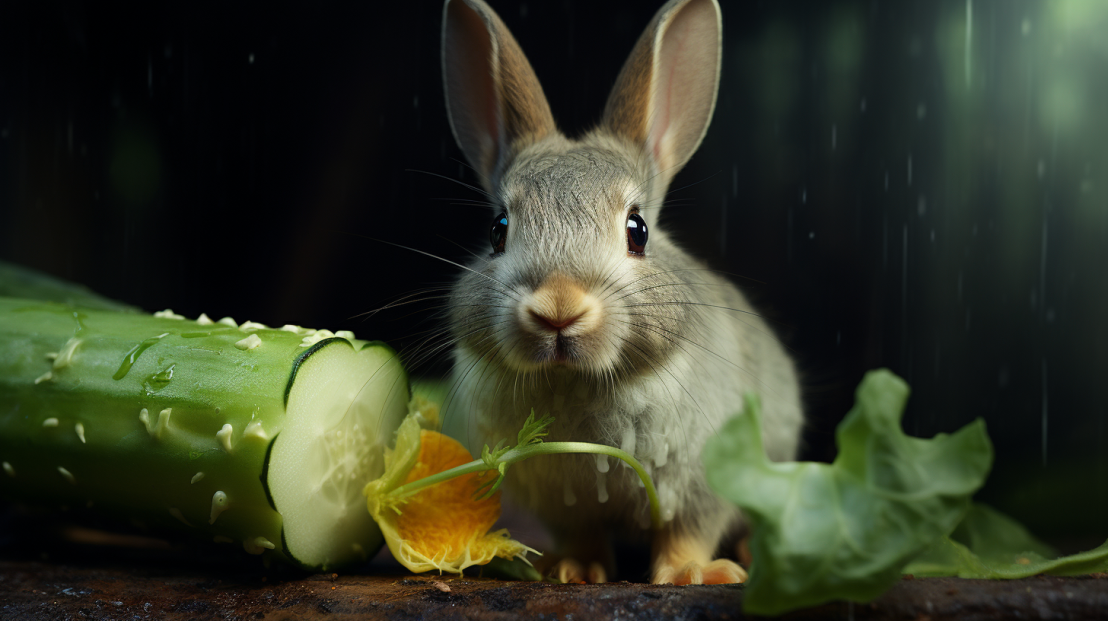Are Cucumbers Safe for Rabbits?
Rabbits are known for their voracious appetites, but not all foods are safe for them to consume. In this section, we’ll answer the burning question – can rabbits eat cucumber? The short answer is yes, rabbits can eat cucumbers. Read on to learn more about how cucumbers are not the only part of a well balanced diet for your rabbit.
1.1 The Rabbit’s Digestive System
Before we delve into the specifics, let’s understand the digestive system of a rabbit. Rabbits are herbivores, which means their diet primarily consists of plants. Their digestive system is designed to handle fibrous and low-calorie food.
Rabbits have a unique digestive process, where they produce two types of droppings: fecal pellets and cecotropes. Fecal pellets are similar to what we commonly know as rabbit droppings. Cecotropes, on the other hand, are soft pellets that are re-ingested by the rabbit. This process, called coprophagy, allows them to extract additional nutrients from their food.
1.2 Nutritional Value of Cucumbers
Cucumbers are a refreshing and hydrating vegetable, but are they beneficial for our fluffy companions as well? Let’s discover the nutritional value of cucumbers and assess their suitability for rabbits.
Here’s a breakdown of the nutritional content of cucumbers:
| Nutrient | Amount per 100g |
|---|---|
| Calories | 15 |
| Carbohydrates | 3.6g |
| Fiber | 0.5g |
| Protein | 0.7g |
| Vitamin C | 2.8mg |
| Vitamin K | 16.4mcg |
| Potassium | 147mg |
| Calcium | 16mg |
| Phosphorus | 24mg |
As you can see, cucumbers are low in calories and provide a small amount of fiber, protein, and essential vitamins and minerals such as vitamin C, vitamin K, potassium, calcium, and phosphorus.
Rabbits have specific dietary requirements, and while cucumbers can contribute to their overall nutritional intake, they should not be the sole component of their diet. It’s crucial to provide a balanced and varied diet to ensure their well-being.
2. Health Benefits of Feeding Cucumbers to Rabbits
Now that we have established the safety of cucumbers for rabbits, let’s take a deeper dive into the potential health benefits they offer. It’s always essential to be aware of the nutritional advantages before introducing any new food into your fluffy friend’s diet.
2.1 Hydration and Water Content
Rabbits require a well-hydrated diet to maintain optimal health. Cucumbers have a high water content, which can help keep your rabbit hydrated. This is especially beneficial during warm weather or if your rabbit tends to have difficulty drinking enough water.
In addition to the water content, the crunchy texture of cucumbers can provide a refreshing and satisfying chewing experience for your rabbit. Chewing on cucumbers can help wear down their continuously growing teeth and prevent dental issues.
2.2 Vitamins and Minerals
Cucumbers are rich in various vitamins and minerals, which can contribute to your rabbit’s overall well-being. Here are some key nutrients found in cucumbers and their potential benefits:
Vitamin C:
Vitamin C is an essential nutrient for rabbits as they are unable to produce it themselves. Cucumbers contain a small amount of vitamin C, which can support their immune system and overall health.
Vitamin K:
Vitamin K plays a crucial role in blood clotting and bone health. Cucumbers provide a small amount of vitamin K, which can contribute to your rabbit’s well-being.
Potassium:
Potassium is an electrolyte that helps maintain healthy nerve function and muscle contractions. Cucumbers contain potassium, which can support your rabbit’s cardiovascular health.
It’s important to note that while cucumbers offer these health benefits, they should be fed as part of a varied diet. A variety of fresh vegetables, hay, and high-quality rabbit pellets should be the main components of your rabbit’s daily meals.
In the next section, we’ll explore the importance of moderation and considerations when feeding cucumbers to rabbits.
Note: Remember to always consult with a qualified veterinarian to ensure you are meeting your rabbit’s specific dietary needs.
3. Moderation and Considerations
While cucumbers can provide health benefits, it’s crucial to exercise moderation and consider a few factors before incorporating them into your rabbit’s diet. In this section, we’ll discuss the importance of portion control and potential risks associated with feeding cucumbers to rabbits.
3.1 Portion Control
When feeding cucumbers to your rabbit, it’s essential to practice portion control. While they can safely consume cucumbers, too much can lead to digestive issues such as diarrhea or an upset stomach. Remember, rabbits have sensitive digestive systems, so it’s best to introduce new foods gradually.
Start by offering a small slice or a few cucumber pieces and observe your rabbit’s response. If there are no adverse reactions, you can gradually increase the portion size. Aim to provide cucumbers as an occasional treat rather than a staple food.
3.2 Food Allergies and Intolerances
Just like humans, rabbits can have allergies or intolerances to certain foods, and cucumbers are no exception. While allergies to cucumbers in rabbits are rare, it’s important to monitor your rabbit for any signs of adverse reactions. These can include diarrhea, bloating, gas, or changes in behavior.
If you notice any unusual symptoms after feeding cucumbers, discontinue their consumption and consult with a veterinarian. They can help determine if your rabbit has an allergy or intolerance to cucumbers or if there may be other underlying issues.
4. How to Safely Introduce Cucumbers into Your Rabbit’s Diet
Introducing new foods to your rabbit’s diet should always be done gradually. Abrupt dietary changes can disrupt their sensitive digestive system and lead to digestive issues. Here’s a step-by-step process to safely introduce cucumbers into your rabbit’s diet:
- Start by washing the cucumber thoroughly to remove any chemicals or dirt.
- Slice a small piece of cucumber, ensuring that it’s cut into rabbit-sized portions.
- Offer the cucumber to your rabbit, observing their response. If your rabbit shows interest and begins nibbling, it’s a good sign.
- Monitor your rabbit for any adverse reactions over the next 24 to 48 hours. If there are no issues, you can continue offering cucumber in small portions.
Remember, moderation is key. Consistently monitor your rabbit’s well-being and adjust the amount of cucumber accordingly.

5. Exploring a Varied Diet for Your Rabbit
While cucumbers can be a healthy addition to your rabbit’s diet, it’s crucial not to rely solely on this vegetable. To provide a balanced and nutritious diet, it’s important to incorporate a variety of vegetables, hay, and high-quality rabbit pellets.
5.1 Vegetable Options for Rabbits
Here are some safe and nutritious vegetable options you can include in your rabbit’s diet:
- Leafy greens: Include a variety of leafy greens such as kale, romaine lettuce, spinach, and cilantro. These provide essential vitamins and minerals.
- Root vegetables: Offer small portions of root vegetables like carrots, beets, and radishes. These can add variety and additional nutrients to your rabbit’s diet.
- Herbs: Certain herbs like parsley, basil, and mint can be excellent additions to your rabbit’s diet. They provide enrichment and can be offered as occasional treats.
5.2 Feeding Guidelines and Tips
When feeding vegetables to your rabbit, it’s important to follow some guidelines and tips:
- Wash vegetables thoroughly before feeding to remove any pesticides or dirt.
- Introduce new vegetables gradually to avoid digestive upset.
- Include a variety of vegetables to provide a well-rounded diet.
- Offer fresh vegetables daily, removing any uneaten portions within a few hours.
- Monitor your rabbit’s behavior, digestion, and overall health to ensure they are thriving.
FAQ (Frequently Asked Questions)
Q: Can rabbits eat cucumber peels?
A: It’s recommended to remove the cucumber peels before feeding them to your rabbit. The peels can be challenging to digest and may cause digestive issues. Opt for peeled cucumber slices to minimize the risk.
Q: Can rabbits eat pickles made from cucumbers?
A: Pickles are not suitable for rabbits. They often contain high levels of salt, vinegar, and other preservatives that can be harmful to rabbits. Stick to fresh cucumber slices instead.
Q: Are there any alternative vegetables to cucumbers that rabbits can eat?
A: Yes, rabbits can enjoy a wide range of vegetables. Some safe options include leafy greens like lettuce and kale, as well as carrots, bell peppers, and celery. Remember to introduce new vegetables gradually to prevent any digestive issues.
Remember to consult with a qualified veterinarian to ensure you are meeting your rabbit’s specific dietary needs and for any additional questions or concerns about feeding cucumbers to your furry friend.
Hey there, fellow nature enthusiasts! I’m Mark Gray, the passionate owner of OutdoorAnimals.com, a hub dedicated to uncovering the incredible world of outdoor animals. Whether you’re a hiker, a four-wheeler, or just someone who revels in the beauty of the great outdoors, you’re in the right place. I seek to understand all varieties of animals, from the great elk to the simple mouse, my goal is to write and share this knowledge with the public.

